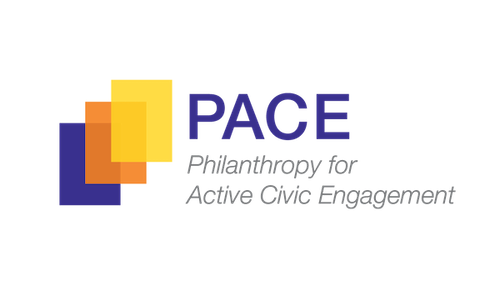Our commitment
We recognize that the work of racial equity is both about what we do and how we do it.

PACE envisions a reality in which “Americans are informed and empowered to contribute to the health and vibrancy of the country’s democracy and civic life.” When inequities exist—including those that exclude or disenfranchise based on race and ethnicity, whether done so intentionally or not—our ability to realize this vision is impeded. Therefore, PACE prioritizes addressing racial inequities in its programming and member support.
What we will do
PACE explores the ways in which people do or do not receive access (based on race) to information and opportunities to participate in civic life, and how structural barriers and inequities manifest through intentional and unintentional exclusion. PACE can influence this by working within philanthropy to ensure thoughtful analysis of issues related to disenfranchisement and raise awareness in ways that strive for the commensurate flow of philanthropic attention and resources.
- • Applied to democracy (our mission), we strive for this by actively participating in experiments and learning that counter tendencies to get mired in antiquated models of what works, and by taking advantage of the power of diverse voices and actors to advance our learning and collaboration.
- • Applied to philanthropy (our environment), we strive for this by working with funders while also staying mindful that philanthropy can at times reinforce the very systemic inequities it is trying to address, including those that disenfranchise or discriminate by race.
- • Applied to PACE (our work), we employ an internal framework through which we strive to establish and steward diverse networks, foster racial equity lens throughout programs and events, and elevate a body of knowledge on the impact of structural racism on democracy and civic engagement.
HOW WE WILL DO IT
PACE staff and board members are committed to stewarding opportunities that create lasting and sustainable impact in pursuit of a pluralistic and multi-racial democracy. We acknowledge this work is ongoing and our statements and beliefs are only as strong as the actions we regularly put into practice.
Our organizational principles include respecting multiple forms of knowledge and action, combatting binary and “one right-way” thinking, equalizing power dynamics, resisting perfectionist tendencies, and accepting that not every question has an objective and universal answer. We believe these are important tenets of what it means to be a “laboratory,” and they are also components that advance a culture and commitment to racial equity.
We know that we will not always get it right. We offer grace and compassion to all (including ourselves), and choose to value people in all their complexity. When we err, we rigorously learn from our mistakes.
This will always be a “working commitment” for PACE’s aspiration, and we will continue to refine it and incorporate learnings into our work. We welcome your feedback.

Our definition and framing
We acknowledge there are many deep and intentional frameworks, spectrums, and definitions that organizations and leaders use to guide the understanding and implementation of racial equity work. In considering this body of knowledge—and asking ourselves where and how PACE can embed racial equity into our work—we adopt the following working definition of what it means to us:
Racial Equity is the condition that would be achieved if one’s racial identity no longer predicted (in a statistical sense) how one fares.
In the context of civic engagement, if racial equity were to be achieved, the ways that different racial groups and communities choose to engage in our democracy would be valued, encouraged, and invested in with equal measure. In the context of a healthy democracy, we would see equal opportunities and fair outcomes for all racial groups.
We understand that there is much work to be done across all elements of diversity, equity, and inclusion (including gender, class, ability, and other elements of identity and experience). But in recognition of the particular challenges created and reinforced by systemic racism, PACE is explicitly focusing on how race equity impacts democracy and civic engagement.
ACKnowledgments
The PACE Board and Staff acknowledge the contributions of many members, leaders, and peer organizations from whom we have learned (and will continue to learn) from throughout our racial equity journey; in particular, our Equity Analyst Danielle Marshall with Culture Principles. We have been inspired by the racial equity commitment adopted by our colleagues at Funders Together to End Homelessness as well as the frameworks of our Members, including the W.K. Kellogg Foundation, Annie E. Casey Foundation, Meyer Memorial Trust, and the leadership of countless others advocating and championing racial equity, including but certainly not limited to: ABFE, CAPD, CHANGE Philanthropy, Policy Link, the Center for Equity and Inclusion, and the United Philanthropy Forum. Read more about what we’ve learned on our journey to developing this commitment.
MAILING ADDRESS
611 Pennsylvania Ave SE, #372
Washington, DC 20003
